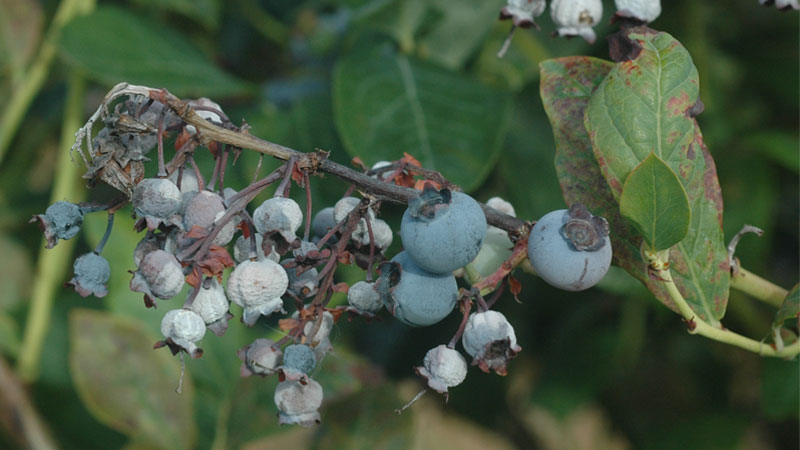This October, VinePair is celebrating our second annual American Beer Month. From beer style basics to unexpected trends (pickle beer, anyone?), to historical deep dives and new developments in package design, expect an exploration of all that’s happening in breweries and taprooms across the United States all month long.
Many breweries such as Jester King, Dogfish Head, and Bell’s use fruit as an adjunct — a non-malt source of fermentable sugar — to create beers with a variety of flavors, textures, and colors. American brewers are increasingly turning to local fruit to craft such varieties as tart raspberry wheat beer, rich cherry stouts, or sour and funky Belgian-style fruit lambics. But this year, fruit harvests are suffering across the United States, and the shortages are impacting some of the country’s most experimental breweries.
The heatwave in the Pacific Northwest this summer broke records, with temperatures reaching 115 degrees in Portland. On Oregon’s farms, this led to fruits such as raspberries and blackberries becoming sun-damaged and shriveled, which meant lower yields and compromised quality. “Three days of extreme heat just crushed the crop,” says Darcy Kochis of the Oregon Raspberry & Blackberry Commission. She estimates a 50 percent crop loss for the region.
The heat wave in Oregon came at the worst possible time for the state’s hardworking growers, Kochis says. She explains that a survey conducted right after the late June heat shows that farmers had been expecting one of their best crops in years in terms of volume and quality. The heat wave was completely unprecedented, though it could be a foreboding sign of challenges in years to come. “Generations of farmers have said that they have never seen anything like this,” says Kochis. “But we would be naïve in thinking that heat is not going to be a factor going forward.”
The trend of experimentation in the craft beer industry relies on brewers’ ability to get hold of the ingredients they need, and at the right price. Plus, the industry-wide push toward more sustainable brewing practices incentivizes brewery owners to source their raw materials locally where possible, reducing their carbon footprint by limiting the distance that the ingredients must travel to reach the brewery.
For brewers in the Pacific Northwest who use fruit in their beers, the news of lost crops in the area is a huge blow.
“Given the large volumes of fruit we source from local growers for our sour beer program, we are acutely aware of the effects climate change has had on agriculture in the Pacific Northwest,” says Kevin Martin, director of brewery operations at Cascade Brewing, located in the Raleigh Hills neighborhood of southwest Portland. The brewery specializes in barrel-aged sour beers that use locally grown produce, in a mission to offer a fantastic taste experience while avoiding what they call the “hops arms race” in the Northwest. Using an acid bacteria called lactobacillus, the brewers impart moderate levels of acidity and sour flavors into beers such as their sour wheat ale with locally grown blackberries, boysenberries and lavender. Martin points out that the reduced availability of certain fruits leads to increased costs, which could put ingredients outside the reach of brewers.
“We’ve seen prices for some of these fruits jump considerably in recent years, with 2021 being one of the most difficult for growers in decades,” Martin says. “This pattern could make sourcing quality, affordable fruit a more challenging task moving forward.”
The impacts of climate change on the region are already affecting the brewery’s plans, and it has postponed some experimental brews due to concern over fruit quality, Martin says. “As the summers become hotter and drier, we’ve seen the wildfire season lengthen and the fires themselves become larger and more frequent, causing smoke to permeate many of Oregon’s wine growing areas,” he says. “This change in wildfire patterns has raised our concerns about smoke taint, where the fruit will pick up an undesirable smokiness that can negatively impact the flavor profile of the finished product. As a result, we’ve had to make the difficult decision in years with particularly high levels of wildfire smoke to forgo these wine-beer hybrid projects altogether, and unfortunately, the incidence of wildfires seems to [be] increasing each year.”
It’s not just farmers in the Pacific Northwest who are experiencing crop shortages. In the Midwest, too, fruit growers have had a difficult season. Juliette King McAvoy, VP of sales & marketing at King Orchards, is one of many farmers in Michigan facing a poor cherry harvest this year.
“This is our second year in a row of a crop failure,” McAvoy says. This year, the farm harvested between 10 and 15 percent of a normal crop — a heartbreaking result. McAvoy explains that the biggest issue was the increased volatility in springtime weather: Early periods of warm weather in late February or early March means that trees can come out of dormancy early. “Then, the weather turns back to normal, or even colder, and we have late-season frosts,” she says. Once the trees have bloomed early, these frosts can kill vulnerable fruit buds.
King Orchards sells concentrates and frozen cherries to the beverage industry, including to breweries, wineries, and cideries. “The brewery industry has been wonderful,” McAvoy says. “There’s so many small producers that care about the taste, how it’s grown, where it’s come from, the quality.” The relationship is symbiotic. Freezing the cherries preserves the nutrients along with the tart cherry flavor and texture, while packaging the cherry juice as concentrate is incredibly efficient thanks to a long shelf life, retaining freshness for a year or more.
Michigan is the nation’s leading producer of tart cherries, and the world’s leading producer of the Montmorency cherry varietal. McAvoy says that this makes the farm’s concentrate especially popular with Michigan brewers.
“For breweries and their customer base, supporting local or at least regional farmers is so important,” she says. “Cherry is kind of like the local, regional flavor.” But though the farm has found success with beverage producers, she acknowledges that these businesses need consistency, which is hard for farmers to offer right now when the yields themselves are fluctuating and increasingly threatened by extreme temperatures. “Increased pricing can definitely change their plans,” she says.
Breweries with an immediate need for cherries might have to temporarily source from out of state in some cases, increasing the carbon footprint of their beers. And as the climate emergency continues, the future of Michigan’s cherries looks uncertain.
“We have had four crop failures in the last 19 years,” McAvoy says. It’s a staggering number — and it’s making her question the viability of their business, and how long King Orchards will be able to grow cherries on its farms. “It’s quite scary to think about,” she says.
For now, breweries will need to be patient with growers, and come up with innovative ways to keep producing their experimental beers. Mitch Ermatinger, owner of Speciation Artisan Ales in Grand Rapids, Mich., says that the local growers he works with have been seeing increasingly erratic growing seasons for a decade, but he is hoping that their perseverance will ultimately win out.
“Grape growers and Michigan fruit growers are very resilient people,” he says. “I know that they are planning ahead by planting varieties that are a little more resistant to the extremes.”
Back at Cascade Brewing in Oregon, Martin remains committed to supporting growers and making the sour fruit beers that define the brewery, even though he acknowledges that it will become more difficult and costly to continue to produce such beers as the impacts from climate change worsen.
“Any winemaker or grower will tell you that you have to work with what nature gives you,” Martin says. “But that work only seems to be getting harder as global temperatures continue to rise.”
This story is a part of VP Pro, our free platform and newsletter for drinks industry professionals, covering wine, beer, liquor, and beyond. Sign up for VP Pro now!

